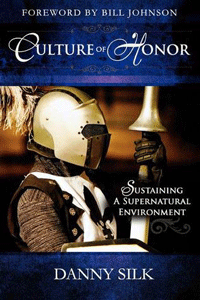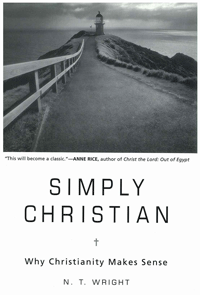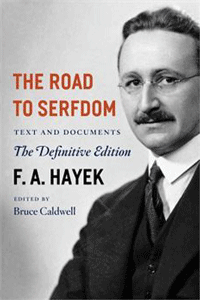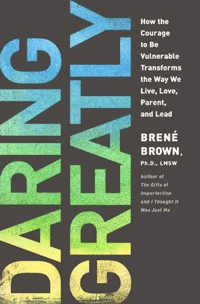 Church government is a topic that has as many opinions as there are churches. In fact, though the Bible talks little about church government directly, it is a main point of distinction among many Christian groups. This is both sad and telling of our fractured world and the bride of Christ. Because of this lack of cohesion, teaching and discussion among Christians on this topic, there are few writings on the subject that don't devolve into particularism.
Church government is a topic that has as many opinions as there are churches. In fact, though the Bible talks little about church government directly, it is a main point of distinction among many Christian groups. This is both sad and telling of our fractured world and the bride of Christ. Because of this lack of cohesion, teaching and discussion among Christians on this topic, there are few writings on the subject that don't devolve into particularism.
One book I have recently read on this subject is Danny Silk's "Culture of Honor: Sustaining A Supernatural Environment". Silk is a senior staff member at Bethel Church in Redding California, most known for its popular leader, Bill Johnson. "Culture of Honor" is a different approach to church government than you might expect. It's main distinctive is embedded in the title of book- that the honor of people is the only way to true leadership of those same people. This is stated upfront in a succinct definition:
The Principle of Honor states that: accurately acknowledging who people are will position us to give them what they deserve and to receive the gift of who they are in our lives.1
Silk provides both strong points and excellent personal/church examples of those points throughout the book. The examples shine of the vibrancy of mercy, wisdom and faith that takes both God and people seriously. It is clear that Silk (and the book therein attributes this clearly also to Bethel) is looking to undermine the assumption of a business world influenced hierarchical church government and supplant on it primarily the pastoral care of mercy and wisdom within the context of a relational, not structure, based leadership. This is somewhat ironic because one of the main refutations that the book makes is actually a claim against the role of pastoral office as a primary overseer of the local church. But I will return to that later.
What I love about this book is it's common sense, and biblically based, understanding of its main thesis- that we are to honor people with the assumption of good in our hearts. Judgment is not an option, and even as leaders, we do not assume acts of "church discipline" are the first solutions to people's failures. In fact, Silk is almost masterful in his application of the Socratic method (guiding people through asking questions as a way of self-discovery) of pastoral counseling. He knows, like great leaders in history have always known, that people change only through internal acknowledgement and willingness to do so. This can often only come when those people are empowered through revelation of their own situation, failures, misunderstandings and sin. None of this can be imputed (and make a heart change) by typical "instructive" methods. Silk rightly leans on this key point:
Asking the right questions in the right way is one of the keys to creating a safe place.2
The author culminates a series of excellent examples into several poignant truths, debunking the need to chastise people into submission, and taking the message of Jesus mercy as the prevailing guideline for our actions, rather than the judgment and criticism so prevalent in many church governmental structures. He confronts this issue of judgment and its fallout head-on:
What offense does to you is it justifies you withholding your love. I get to withhold my love from you when you have broken the rules, because people who fail are unworthy of love, and they deserve to be punished. In fact, what punishment looks like most often is withholding love. And when I withhold love, anxiety fills the void, and a spirit of fear directs my behavior toward the offender.3
This brilliant statement is a cogent explanation of so many of Jesus teachings on leadership and sin, especially the specific lessons he was pointing to in his parables of the good Samaritan and the prodigal son. Silk, and Bethel, seem to have found an articulation for how to apply these deep truths that rises above the need to control people, based on their fear of "getting messy" with difficult situations and people. The book pivots on the idea that "we are un-punishable"4, which is related not only as a core value but a culture changing reality for the church and the world- and who can argue with him! Silk has found in church government a place in dire need of the cross and Christ's work on it- the mercy of God, removing judgment from our realm to God's.
For these points, "Culture of Honor" is one of the best books you can read on church leadership and how to lead in relational grace rather than shaming or controlling people into "Christian behaviors". Interestingly enough, after recently finished reading Brené Brown's "Daring Greatly", I found that "Culture of Honor" is (at its core) a biblical exposition of the truths Brown discovers (through her research), that shame ultimately always fails as an effective motivator and leadership tool. An odd juxtaposition, to be sure, yet these books are linked in their foundational message of leaving shame-based methods and moving to forms of trust (in Brown's book vulnerability; in this book faith) that provide relational, not positional, power to influencing others.
Silk is expressive in his passion for his viewpoint and one can't argue with his experience for which he claims to be witness to the power of his model being operable- presumably, the church community he is a part of thrives in the leadership architecture of he describes in the book. As I said, I enjoyed the book and found its primary points- honoring people, valuing their worth, Socratic-method counseling/pastoral care, creating safety in community and confrontation, the value of Christ's work making us un-punishable, avoidance of shame-based manipulation, faith/risk/vulnerability, reliance on the Holy Spirit, viewing the "on earth as it is in heaven" of Matt 6 as the primary perspective of God's kingdom intersecting and invading our real world, the inclusion of apostolic and prophetic ministries as essential components to local church leadership- to be excellent examples of the mercy-centered orthopraxy from which Jesus himself modeled ministry.
But to give this review its full treatment I must state where I felt the book falls short of what appears to be one of its main goals- to establish a new "order" of hierarchical rank in local church government. Specifically, Silk uses 1 Corinthians 12:28, which says "And God has appointed in the church, first apostles, second prophets, third teachers, then miracles, then gifts of healings, helps, administrations, various kinds of tongues."5 to attempt to justify this assumption about a hierarchical order of church government:
Paul clearly lays out an order of priority in this passage, and this order is related to the realms of the supernatural that correspond to each particular office.6
From this assumption, the author builds a lengthy argument and reasoning around establishing apostles as the current positions which should play the foundational role in church government. The problem is, he does not substantiate it well from scripture. One has to make the interpretive jump with Silk that "first...second...third" was implicit to authority and NOT to order of operation or a timeline. Further, the context of this entire section of Corinthians is actually the inverse point that the Silk is trying to draw from this single passage in a few ways.
View a detailed review of points that I felt were poorly made in this book.
Poorly Made or unclear points Culture of Honor
First, the whole point of Paul's chapter 12 (even letter for that matter) is to stop the misuse and jealousy that has arisen over the perfusion of gifts in the Corinthian church. The entire chapter 12 is a rhetorical question for Paul, where he is saying that all gifts are needed and we do not need to continue to use distinction as a fulcrum for division or comparison, as seen easily in verses 29-31. Almost in a sense of frustration, Paul exhausts a rhetorical list of questions- the "all are not"s and "all do not"s are concluded by the "are they" and "do they"s respectively. So Paul is actually trying to point people away from declaring one thing is more important than others, even as a government, not trying to establish a "pecking order" as Silk is theorizing.
Second, Paul diffuses any comparisons and such thinking by closing this chapter by saying "And I will show you a still more excellent way" (1 Cor 12:31b). And it is on this note that Paul leaves what he considers an obviously erroneous line of thinking (comparing and ranking gifts) for perhaps his most famous Pauline chapter, 1 Cor 13, where the language and character of love become the central theme of Paul's exposé. It seems obvious that if Paul was trying to establish a power structure in the church, he wouldn't have done it in a chapter basically scolding the Corinthians for doing just that- comparing and ranking their gifts and roles.
Third, along with his transition into the love chapter, Paul says this in verse 31 "But eagerly desire the greater gifts". Interestingly, once he says this, he never mentions the apostolic again, although he reiterates other items on the list, including prophecy, tongues and does so without keeping the same order. If Paul deigns to mention the apostolic in relation to the actual active gifts within a local church (the remainder of the instructive Corinthian text), yet does not exclude prophetic and tongues, what does this mean?
It seems incongruent that he would set up a "model" of apostolic government if he did not express that throughout his other writings. And this is just what we find- Paul mentions apostles again in few places, but any of which could refer to the singular grouping of church establishment activities that the apostles (the twelve plus Paul and others who are labeled apostles) did to spread the gospel and found churches. In our 21st century thinking, the modern day missionary seems more of a job description of New Testament apostle than a governmental station within a local church. Apostles founded churches, set in pastoral and leadership and moved on. This is the scriptural and historic legacy of Paul's work throughout the entire Mediterranean world, not the least with his detailed example of Timothy.
Silk, however, tries to deconstruct the concept of pastoral leadership of church government with the single scripture in 1 Cor 12:28, even though in Paul's similar outline list of church government shown in Ephesians 4:10-12, where it says:
He who descended is Himself also He who ascended far above all the heavens, so that He might fill all things.) And He gave some as apostles, and some as prophets, and some as evangelists, and some as pastors and teachers, for the equipping of the saints for the work of service, to the building up of the body of Christ;
Silk never deals with this scripture, even though it's context is clearly intended at exploring leadership in the local church as clarified by Paul's clarifying purpose in verse 12 (and 13, though not quoted) :
for the equipping of the saints for the work of service, to the building up of the body of Christ;
Paul is saying, in essence, that "here is the collection of leadership roles we need in local churches to equip the body of Christ". Silk diffuses common sense when trying to jump around and grasp at whatever self-defining examples he hopes to pigeon hole into his thesis. At one point he says:
Jesus, who modeled the office of the prophet, walked around giving supernatural sight to others all day long.7
Yes, Jesus did walk around and do supernatural things. But this sentence creates more misconceived definitions of a term (prophet) that Silk then connects with whatever random attributions he thinks helps his book, rather than nail down a definition. As a result, he begins to ramble from one non-sequitur to another hoping the reader will just go along with his meandering "undefinition", in this case of prophet. Again, I don't disagree with Silk that Jesus is a prophet, but the historical, Jewish and scriptural definition of the kind of prophet that Jesus had come to be is not the definition Silk is bantering about in his 21st century "give words and heal people" colloquialisms.8 And Silk does this with other terms as well (not the least of which is apostle).
Why am I coming down so hard on Silk for missing these things? Because he is trying to assert something very strongly in this book, but he does a weak job of actually making his case. This frustrates me partly because I actually like where Silk is going in the book, but I feel he derails his own credibility by both not properly supporting the scripture he does use, and not dealing with scriptures that appear to contradict his thesis.
Silk makes several other missteps as well, all of which break down the credibility of his book. The most strange of which, is when the writer creates self-insulating arguments to prove his theories and debunk others. In a series of antagonistic snaps at "teachers" (which are actually mentioned in both 1 Cor 12 and Eph 4- unlike apostles which he is elevating) Silk randomly asserts that modern teachers are simply 21st century Judaisers:
The teachers, as the primary influence in the Church, have turned our attention to the law.9
Silk fails to acknowledge that scripture is not the same as the pejorative law he is inferring here. If we held that, we couldn't use it to explore or explain anything, let alone help us define church government. And since the author is actually trying to use scripture to help him define it, it's probably not best to commend its use for his own purposes, but quash it for others opposite views. But, sadly, Silk takes this one step further and outright declares that the "current" leadership models present in most churches are all wrong because they don't conform to his viewpoint of apostle/prophetic (top-down) hierarchy, and anyone who might try to disagree with him is de facto wrong if they try to use scripture as the basis for their disagreement. When talking of how a pastor (using him as an example of the old regime) would approach Silk's "new order" of church government, Silk expounds the issue with pastors and teachers:
The need to "prove" something scripturally was part of his ceiling, a limitation that strengthened his focus as a teacher but constrained his ability to operate with other priorities when it came to other tasks of leadership.10
Again, it's hard not to read the above without assuming the author is trying to create self-insulating arguments from which he hopes others must be held liable, but from which he hopes to escape (IE. he is allowed to use scripture to prove his point, but others may not use it to have an alternative viewpoint). Once Silk binds himself in this illogical double-jeopardy, the reader is left wondering why he didn't just humbly say- "here is what we think at Bethel. We aren't sure it's all right, but it works for us. Scripture isn't real clear about this, but this seems to be a helpful model". Instead, we are given what amounts to a few trails of broken conjecture that weakens the superstructure of his arguments.
This is disheartening, because (as I mentioned at the outset) this book has some excellent things to say. I love the main premise (and title) of the book, I agree with much of the foundational and grace-centered basis of the Bethel approach to leadership and conflict resolution, and I even like the important reconsideration of the roles of apostle and prophet into the local church government. However, the support and exploration of the church governmental theory is so poorly done as to undermine the value of the hypothesis. I am not even saying the hypothesis couldn't be true- I just don't think this book does a good job of doing that. Also, the tone of the book, at times, does not help endear the reader to give more benefit of the doubt to the author. At times, it sounds self-assured and perhaps even condescending to those who might not agree (a la "you might think you know, but listen, we've got this figured out"). I just think a bit more language of "consider this" throughout the book would have taken it from being a book that sounds sure of itself, to being one that church leaders might want to chew on and consider its points more seriously.
In the end, despite my long and detailed comments of frustration (mentioned above), I strongly recommend people read this book. Especially to any church leaders who are looking for insightful perspectives on church government. Struggle with this book, as I did. Read the stories, be inspired by them. And try to untangle the disconnected logic from the main ideas. As one church leader said "eat the meat, spit out the bones". I initially read this book as an assignment, and when I was finished I thought "I could definitely serve at a church with that model". I'd use this book to explain the model- as it does that well- I just wouldn't try to use this book to defend it.
Amazon Link: http://amzn.to/11qULKf
Review by Kim Gentes
1. Silk, Danny (2009-12-28). Culture of Honor: Sustaining a Supernatural Enviornment[sic] (Kindle Locations 179-180). Destiny Image. Kindle Edition.
2. Ibid., (Kindle Locations 318-319)
3. Ibid., (Kindle Locations 1076-1079)
4. Ibid., (Kindle Location 1181)
5. Ibid., (Kindle Location 566-568)
6. Ibid., (Kindle Location 569-570)
7. Ibid., (Kindle Location 720-721)
8. The prophetic model of Old Testament scripture, that Jesus did come to fulfill, is one of a Godly criticism to the people of Israel. Unlike our idea of explaining the future, most of what is labeled prophetic in the old and New Testament is the balancing critique of Gods voice. Often confronting, correcting compelling and reframing people's expectations and worlds against the call of God. Again, prophetic certainly does have a revelatory nature of all its operation but its clear that scripture most often has it as a balancing voice of insight meant to keep the Israel/the church from become self focused.
9. Silk, Danny (2009-12-28). Culture of Honor: Sustaining a Supernatural Enviornment[sic] (Kindle Location 746-747). Destiny Image. Kindle Edition.
10. Ibid., (Kindle Location 1326-1328)
 christianity,
christianity,  history,
history,  jesus,
jesus,  kingdom of god,
kingdom of god,  n.t. wright,
n.t. wright,  nt wright,
nt wright,  questions about christianity,
questions about christianity,  simply christian,
simply christian,  theology,
theology,  wright in
wright in  Apologetics,
Apologetics,  Art,
Art,  Bible,
Bible,  Book Review,
Book Review,  Church,
Church,  Community,
Community,  Counsel,
Counsel,  Creation,
Creation,  Devotion,
Devotion,  Easter,
Easter,  History,
History,  Jesus,
Jesus,  Justice,
Justice,  Liturgy,
Liturgy,  Ministry,
Ministry,  Mission,
Mission,  Old Testament,
Old Testament,  Prayer,
Prayer,  Resource,
Resource,  Resurrection,
Resurrection,  Theology,
Theology,  Worship
Worship 



